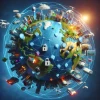
In an era where the internet is as essential as electricity, the concept of internet censorship can seem like a distant concern—until it affects you directly. Imagine waking up one day to find that your favorite social media platform is inaccessible, or that you can't read the latest news from your preferred sources. Internet censorship is not just a buzzword; it's a reality impacting millions worldwide. Understanding what it is and how it can affect you might just be one of the most crucial insights you gain today.
Understanding Internet Censorship
Internet censorship refers to the control or suppression of what can be accessed, published, or viewed on the internet by regulators, often government bodies. The goal? To restrict access to information deemed inappropriate or harmful, although the criteria for these labels can be highly subjective. Censorship can range from blocking specific websites to filtering search results, and even monitoring private communications.
Why Does Internet Censorship Occur?
The reasons behind internet censorship are as varied as the methods used to enforce it. Governments might implement censorship to maintain political stability, protect national security, or preserve cultural norms. However, it's not just authoritarian regimes that employ these tactics. Even in democratic societies, debates about censorship often arise around issues like hate speech, misinformation, and the protection of minors.
Methods of Internet Censorship
Understanding how censorship is implemented can reveal its pervasive nature. Common methods include:
1) **IP Blocking**: Restricting access to specific IP addresses.
2) **DNS Filtering and Redirection**: Manipulating DNS responses to prevent access to certain domains.
3) **Packet Filtering**: Examining data packets and blocking them based on content.
4) **URL Filtering**: Blocking specific URLs based on keywords or patterns.
5) **Deep Packet Inspection**: Analyzing packet content in detail to enforce censorship.
Real-World Examples: From China to the USA
China's 'Great Firewall' is perhaps the most infamous example, where a combination of technology and regulatory measures restricts access to foreign websites and filters politically sensitive content. In contrast, the United States may not have as overt a system, but issues like net neutrality and debates over social media regulation highlight subtler forms of censorship. Each country balances freedom and regulation in its unique way, often sparking heated discussions about the boundaries of free speech.
How Internet Censorship Can Impact You
On a personal level, censorship can limit your access to information, infringe on your privacy, and even affect your business if you rely on the internet for international communication or transactions. Imagine being unable to access critical resources for a school project, or being cut off from a global audience if you're a content creator. The ripple effects of censorship can be both immediate and far-reaching.
Navigating Internet Censorship: Tips and Tools
If you find yourself facing internet censorship, there are tools and strategies you can employ:
1) **VPNs (Virtual Private Networks)**: These can mask your IP address and encrypt your internet traffic, allowing you to bypass restrictions.
2) **Proxy Servers**: These act as intermediaries, helping you access blocked content.
3) **TOR Network**: This offers anonymity and can help circumvent censorship by routing your internet traffic through a series of volunteer-operated servers.
However, it's crucial to understand the legal implications of using such tools in your country to avoid potential penalties.
Common Mistakes to Avoid
When dealing with internet censorship, avoid these pitfalls:
1) **Ignoring Legal Risks**: Some countries impose severe penalties for circumventing censorship.
2) **Over-reliance on Single Tools**: Diversify your approach; relying solely on one tool like a VPN can be risky if it fails.
3) **Neglecting Security**: Ensure your tools are trustworthy to avoid potential data breaches.
The Future of Internet Censorship
As technology evolves, so too will the methods of censorship. The rise of AI and machine learning offers new tools for both enforcing and circumventing censorship. The ongoing battle between freedom and control on the internet will likely intensify, making it ever more important for individuals to stay informed and proactive about their digital rights.




























